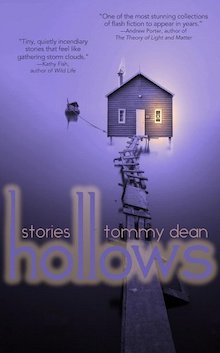
Alternating Current, 2022
In the title story from Hollows, Tommy Dean’s new collection of flash fiction, two teenage boys lie in a street. One asks the other what they’re doing there.
‘We’re dying. Can’t you feel it?’ your voice oozing with smoke rather than tears.
No, I want to say, but there’s a code here, a puzzle that expects something of me, from me, if I want to be your friend.
The characters disagree about a feeling as big as death — one inviting it, the other resisting — as they claw toward something better: the promise of friendship. It’s a small moment that, by representing something vaster, functions as a metonym for Dean’s collection, which depicts ordinary Americans puzzling through how to improve on difficult circumstances.
Dean’s stories are peopled by ordinary adults and teenagers: kids jumping off a bridge to their deaths, newlyweds bound for divorce, would-be parents who can’t stay pregnant. Many live in forgotten small towns. Dean sets their stories against familiar backgrounds, from fraught moments like Y2K and 9/11 to persisting catastrophes like floods, hurricanes, foreclosures, and wars. These settings could be the “hollows” of the title: secret, empty places, both real and metaphorical, where tales unfold and lives unravel.
But in the context of these stories, “hollows” also functions as a plural adjective, describing characters who long for better lives but rarely get them. Instead they grapple with the emptiness of unfulfilled want. By the end of the 45-story collection, the reader, too, feels that hollowness, having lived with and inside these downtrodden characters for so long. In the award-winning “You’ve Stopped,” the main character watches his partner die due to starvation, literally becoming hollow, after an apocalyptic event. Another story, “Arriving,” tackles infertility — the unwanted hollowness of a uterus — as experienced by a couple living across from a family. When the two children construct four snowmen, the wife can’t stand the sight of them, so the husband kicks two of them, the babies, to the ground.
A hollow can also be a metaphor for the space in which a narrative develops. In addition to writing his own flash, Dean teaches flash fiction workshops and edits journals devoted to the form. His commitment tempts me to view his title through the lens of craft. A flash begins as an empty container. As we read, this hollow becomes the space in the mind that’s occupied by these powerful yet bite-sized stories.
Dean’s stories open with memorable lines that bring the inciting incident and conflict quickly into view. “If It Weren’t For the Lights” begins: “Hurricane Jacob prowls across the meteorologist’s map, but I’ve been disappointed by every man I’ve known, so I refuse to evacuate.” Dean introduces the inciting incident (a hurricane), a conflict (the woman refuses to evacuate), and key traits of the protagonist (disappointed by men, stubborn) in one powerful line. Similarly, “Just the Father” establishes a main character’s struggle in few words: “Shane stands in the living room of his new apartment and tries to think of a way to keep his wife from leaving him again.” The first line of “A Thrumming Silence” offers emotional stakes and an indication of the conflict to come: “The day my brother died, I broke into my best friend’s house.” Here the narrator is a cipher, hollowed by his brother’s reckless death, who reacts with his own small reckless act.
Dean often extends his central metaphor by turning objects into containers ready to be filled with meaning. Witness, in the story “Wave,” the significance of a few cups: “The Disney cups bought at garage sales for nickels, while we joked about needing them for the children, the ones this second marriage was supposed to provide…” In less capable hands, cups in a cupboard might remain mere drinking vessels, but Dean employs them to show us the poverty of this couple, their forsaken hope, and the way it was lost.
Readers of flash often feel disoriented as they try to map out a story’s initial who, where, what, when, and why. Dean is comfortable with, and perhaps even invites, this confusion. Each of the ultra-compact stories in Hollows quickly becomes a puzzle to solve, one that reflects the gulf between emptiness and meaning. As the reader considers and reconsiders these stories, she moves from ignorance to understanding, from feeling lost to finding her place, and in this fashion, the hollow brightens. By filling the mind’s “hollow” with something new — a story, a character, an insight — Dean leaves the reader feeling satisfied as well as changed by the experience of reading.
+++
+